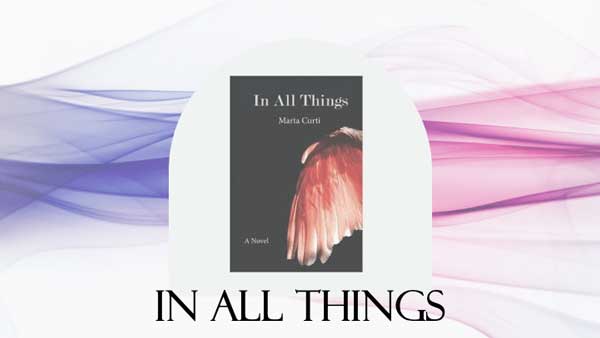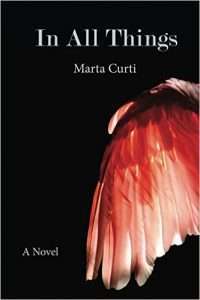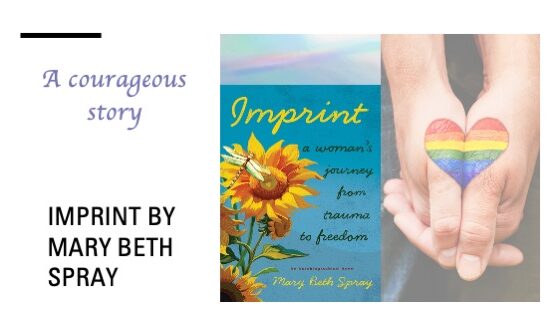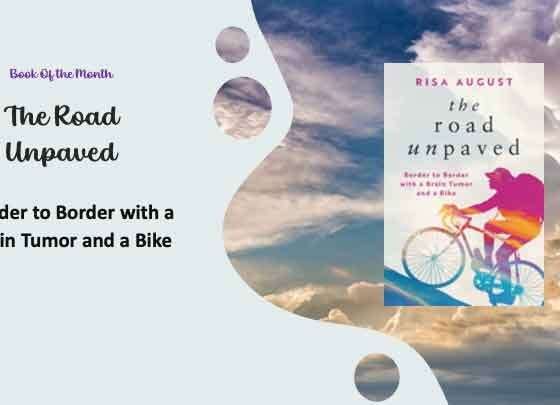In All Things The debut novel by Marta Curti

The Process” (or how it came to be)
I first got the idea for In All Things when I was working as a field biologist in Panama. While hiking through the forest, I often heard Chestnut-headed Oropendolas calling overhead. Their song is quite distinctive and sounds like “bubbles rising to the surface of a delicate liquid and popping.” When this phrase “popped” into my head, I thought it would be an interesting way to describe someone’s voice. With that idea, the main character of the novel, Penny Rose, was born. Pretty soon afterwards, I knew what the main premise of the novel would be – Penny would discover she was terminally ill and would need to find the right person, in a world full of strangers, to raise her child after she was gone.
I used my time hiking in the forest to think about the characters and the different plot lines and themes (love, loss, creating beauty out of tragedy) I wanted to bring into the story. Over the following seven years I wrote and edited and wrote and edited some more until I was finally happy with the final product.
A little bit about me
I have been writing for most of my life – I “self published” my first book at age 7 (a single edition, with much of the text copied almost word for word from the Sunday strips of the Peanuts cartoon). Since then, I am happy to report that I have moved on to write original works of poetry, fiction, and nonfiction. I think my love for writing came from my mother, who read to my siblings and I every night before we went to bed. I went to sleep dreaming of wonderful worlds created only with words.
Apart from writing and reading, I love hiking (or anything I can do outdoors), traveling, and art. I currently work as a raptor biologist for a non-profit conservation organization, am part owner in a birding tour company and also teach yoga. I feel very fortunate to be able to do so many things that I love.
A little bit about the story
In All Things is the story of a woman searching for the right person to raise her child after she is no longer able to. When we first meet Penny she has just learned that she is terminally ill. The novel follows her back and forth through time and her struggles to find love in unconventional ways. Orphaned at birth by a mother who took her

Marta Curti
own life, Penny is alone in the world until she gives birth
to her only child, August, and her world changes in ways that even she could not imagine. At the slightest touch (a handshake, shoulders brushing ever-so-lightly on a crowded street) – Penny and August can at once see the darkest secrets inside other peoples’ hearts. These are stories of loves gained and (almost always) lost: a boy who watches his sister drown and then must suffer the violent grief of his father; a doctor who has never quite recovered from the loss of love and hope suffered when she was only twelve years old. Some of these strangers will pass quickly in and out of Penny’s life, others will touch her forever, but when Penny realizes that the answer to the question of who will raise her son after her death has been in her heart the whole time, she finally understands that these people were drawn to her not for their survival, as she had once believed, but instead for her own and that in all things there is beauty even if we have to make it for ourselves.
In All Things is available for purchase as a paperback or for Kindle at Amazon and Barnes and Noble, among other outlets.
Please enjoy an excerpt
When I looked around the room, I saw them all and I somehow knew all of the hearts in this story, all of the hearts connected to this event, all the hearts changed by what was to come. I saw Joe’s mother knitting on the couch, while Joe and his sister were splayed out on the floor, reading. A fire burned in the fireplace. It had been a cold winter, and I felt the chill raising the hairs on my arms. That morning, Joe’s father had gotten up early to catch the morning light against the snow. He made a decent living selling his stark black and white photographs of people, animals, and leafless trees with branches outstretched like the hands of fallen angels reaching for one last grasp at heaven.
As with all the others, I knew. I knew Joe and his sister were anxiously waiting for their father to return. I knew that to Joe, his dad’s job was a mystery. Joe didn’t understand how his father could go out into the world, the same exact world Joe lived in, and come back with pictures so beautiful they didn’t seem to belong to this ordinary place in which the rest of us existed. Joe had seen some of the people and objects (a rusted car with a bird nest inside, a collapsing barn in a field of flowers) his father had photographed over the years, but they always looked plain and regular when they weren’t frozen inside a frame on a sheet of glossy paper. Joe wanted to learn the secret of taking ordinary things and making them seem otherworldly. Though he wouldn’t admit it to his sister, Joe secretly hoped it was magic.
Kelly, on the other hand, was merely bored stuck inside the house with her baby brother. They exchanged a look, a mere glimpse, and each knew what the other was thinking. They were going to make a break for it. They knew their mom, who lost all track of time when she was knitting—distracted by what she perceived as her own personal art—would not notice their absence for at least a good ten minutes. So they nonchalantly crept from the living room into their bedrooms to get ready before sneaking out the back door.
To prepare for the day’s adventure, Joe put on his down coat, gloves, and a cap and scarf his mom had knitted for him last Christmas. Kelly, apart from her warm clothes, packed a backpack full of snacks, a sketch pad, some colored pencils, her favorite book on art given to her by their father for her birthday one year, and a tiny makeup case containing a small mirror, some blush, and lipstick.
“That looks heavy,” Joe said eyeing his sister’s backpack. “Why do you have to carry all this stuff anyway?”
“If I’m going to be an artist one day,” she said, picking up the bag and threading her arms through each strap, “I definitely need to carry my art supplies with me at all times. What if we run into a herd of deer just begging to be sketched? What kind of artist will I be if I let a chance like that slip by?”
“And the book?”
“I might need to look for tips on how to perfect my shading. If the deer are moving, I won’t have much time to capture them and I want to get it just right.”
“And the makeup?”
“There are other cabins across the lake. You never know what cute boys might show up to watch me sketch my very first masterpiece.”
“Oh brother…”
Once outside, they followed their father’s footsteps through the snow. They walked for about 20 minutes before they found him. He was standing in the middle of a frozen lake, sure-footed atop the slippery surface. He had such a bold, confident way about him it seemed no earthly forces applied to him. Joe’s grandparents even used to brag, our son must have a pact with God Himself. He has never been sick a day in his life.
And it was true. He grew up on the Chumash Reservation in southern California and had a childhood typical of anyone who grows up with nature as a playmate. He climbed trees; tracked roadrunners along dusty paths; played war games with his friends among the boulders; and trapped lizards, toads, and even once a rattlesnake to keep as pets (all of which his mother made him set free the instant she discovered their presence in her home). The days of his youth passed without even the minor but common problems his classmates seemed to face: a few missed days of school due to a bad cold; an arm fractured from falling out of a weak-limbed tree; the normal scrapes and bruises of childhood games. When he graduated from high school, he left the reservation and decided to test his luck in the larger world. He met a beautiful woman, got married, moved up north, and had two wonderful children. It seemed that every single day of his life had been perfect. Now, when he thought about his parents’ words he conceded that maybe they had a point; for as an adult, he believed he could walk across this ice with a hundred men at his side and he alone would not stumble, he alone would not fall. He stood without fear or doubt. And whether he really did have a pact with God or not (and who can say for sure), one thing is certain. God chose that day to reveal just how much one person can lose in a single day. Whether God reneged on a deal or no pact had existed in the first place, it didn’t really matter. The result would be the same.







